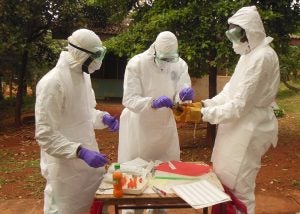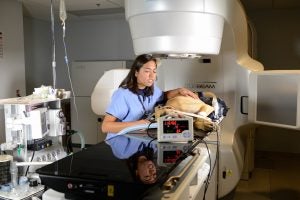“It is health that is real wealth and not pieces of gold and silver.” – Mahatma Gandhi

Researchers with the PREDICT program in Tanzania, testing bats for disease that could spread to humans.
Almost daily, as a society, we experience the connection and consequences between the health of humans, animals and the environment. The Zika virus — carried by mosquitoes and spreading in many regions of the world — is suspected of causing thousands of human birth defects in Brazil and was declared a public health emergency by the World Health Organization. As much as 75 percent of new or re-emerging diseases affecting humans are of animal origin.
New infectious diseases, climate change, and a moving political landscape are some of the changes that veterinarians, physicians, scientists and other health and environmental professionals must adapt to in meeting these global challenges. That’s where we know the emerging approach known as “One Health” comes in, uniting these professionals in many parts of the world to address complex problems that recognize the vast interrelationships between human, animal and environmental health.

Dr. Brian Bird (Ph.D. ’08, DVM ’09) outside an Ebola Treatment Unit in Sierra Leone, with a group of kids who had recovered from the virus and were celebrating their discharge.
One Health harnesses the power of collaborative expertise to solve the pressing issues we face in our mobile society. For example, early detection and prevention of the Ebola virus outbreak in Africa in 2014 was aided by a team of UC Davis investigators, including veterinarians. This was not the case in a later African outbreak, where a less timely response allowed the virus to spread in other parts of the world. In the 1990s, the first cases of mad cow disease in cattle in the United Kingdom and West Nile virus in birds were first detected or confirmed by astute veterinary pathologists who understood the One Health approach.


